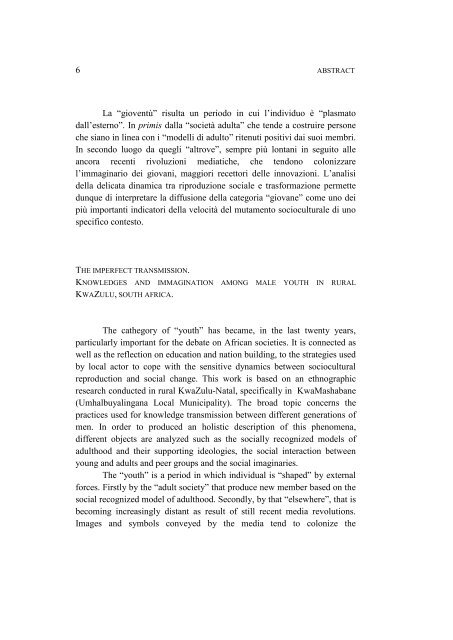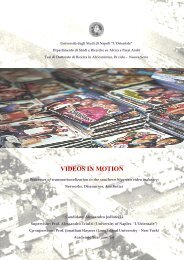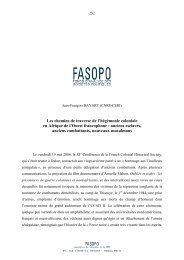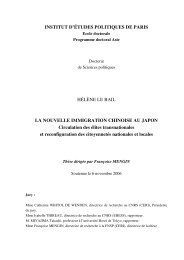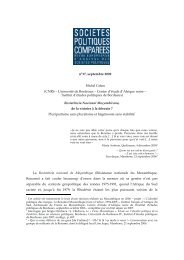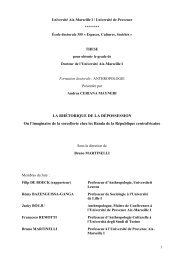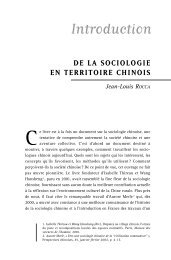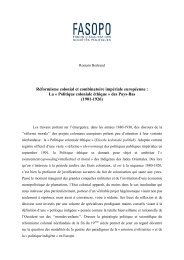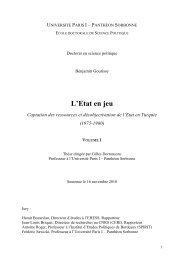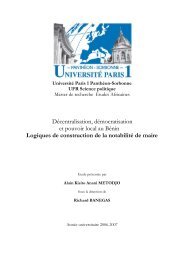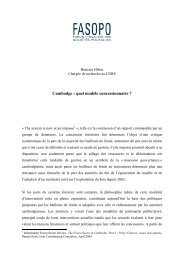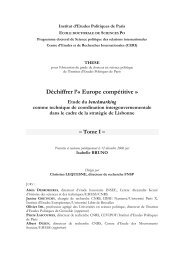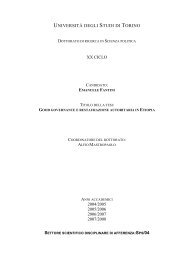- Page 1: Università degli Studi di Torino S
- Page 5 and 6: INDICE 1 INDICE Abstract ………
- Page 7 and 8: INDICE 3 4. La produzione di audiov
- Page 9: ABSTRACT 5 ABSTRACT LA TRASMISSIONE
- Page 13 and 14: NOTA LINGUISTICA 9 NOTA LINGUISTICA
- Page 15 and 16: INTRODUZIONE 11 INTRODUZIONE Nel 20
- Page 17 and 18: INTRODUZIONE 13 vista dei giovani d
- Page 19 and 20: INTRODUZIONE 15 del tessuto di rela
- Page 21 and 22: INTRODUZIONE 17 suggestioni per la
- Page 23 and 24: ANTROPOLOGIA DEI GIOVANI 19 CAPITOL
- Page 25 and 26: ANTROPOLOGIA DEI GIOVANI 21 essere
- Page 27 and 28: ANTROPOLOGIA DEI GIOVANI 23 colloca
- Page 29 and 30: ANTROPOLOGIA DEI GIOVANI 25 infatti
- Page 31 and 32: ANTROPOLOGIA DEI GIOVANI 27 globali
- Page 33 and 34: ANTROPOLOGIA DEI GIOVANI 29 viaggio
- Page 35 and 36: ANTROPOLOGIA DEI GIOVANI 31 diventa
- Page 37 and 38: ANTROPOLOGIA DEI GIOVANI 33 maggior
- Page 39 and 40: ANTROPOLOGIA DEI GIOVANI 35 esempio
- Page 41 and 42: ANTROPOLOGIA DEI GIOVANI 37 volta i
- Page 43 and 44: ANTROPOLOGIA DEI GIOVANI 39 generaz
- Page 45 and 46: ANTROPOLOGIA DEI GIOVANI 41 condott
- Page 47 and 48: ANTROPOLOGIA DEI GIOVANI 43 sociali
- Page 49 and 50: ANTROPOLOGIA DEI GIOVANI 45 essere
- Page 51 and 52: ANTROPOLOGIA DEI GIOVANI 47 rituale
- Page 53 and 54: ANTROPOLOGIA DEI GIOVANI 49 tema de
- Page 55 and 56: ANTROPOLOGIA DEI GIOVANI 51 antropo
- Page 57 and 58: ANTROPOLOGIA DEI GIOVANI 53 Repubbl
- Page 59 and 60: ANTROPOLOGIA DEI GIOVANI 55 decise
- Page 61 and 62:
ANTROPOLOGIA DEI GIOVANI 57 dell‟
- Page 63 and 64:
ANTROPOLOGIA DEI GIOVANI 59 “mode
- Page 65 and 66:
ANTROPOLOGIA DEI GIOVANI 61 sempre
- Page 67 and 68:
VERSO UN PRESENTE 63 CAPITOLO II VE
- Page 69 and 70:
VERSO UN PRESENTE 65 potesse raggiu
- Page 71 and 72:
VERSO UN PRESENTE 67 questa tesi (K
- Page 73 and 74:
VERSO UN PRESENTE 69 definibile com
- Page 75 and 76:
VERSO UN PRESENTE 71 matrice democr
- Page 77 and 78:
VERSO UN PRESENTE 73 distingue dall
- Page 79 and 80:
VERSO UN PRESENTE 75 il regno Zulu,
- Page 81 and 82:
VERSO UN PRESENTE 77 umndeni: mentr
- Page 83 and 84:
VERSO UN PRESENTE 79 all'interno de
- Page 85 and 86:
VERSO UN PRESENTE 81 principale dur
- Page 87 and 88:
VERSO UN PRESENTE 83 l‟allineamen
- Page 89 and 90:
VERSO UN PRESENTE 85 diffuso di un
- Page 91 and 92:
VERSO UN PRESENTE 87 inglesi e i du
- Page 93 and 94:
VERSO UN PRESENTE 89 Negli anni Tre
- Page 95 and 96:
VERSO UN PRESENTE 91 pienamente ins
- Page 97 and 98:
VERSO UN PRESENTE 93 GIUDIZIO SULLA
- Page 99 and 100:
VERSO UN PRESENTE 95 popolazione it
- Page 101 and 102:
VERSO UN PRESENTE 97 loro più faci
- Page 103 and 104:
VERSO UN PRESENTE 99 dall‟induna,
- Page 105 and 106:
VERSO UN PRESENTE 101 interlocutori
- Page 107 and 108:
VERSO UN PRESENTE 103 deteriorando.
- Page 109 and 110:
VERSO UN PRESENTE 105 in cui “gua
- Page 111 and 112:
VERSO UN PRESENTE 107 tempo era pos
- Page 113 and 114:
VERSO UN PRESENTE 109 Nonostante i
- Page 115 and 116:
VERSO UN PRESENTE 111 GRAFICO N. 1.
- Page 117 and 118:
VERSO UN PRESENTE 113 Se le statist
- Page 119 and 120:
VERSO UN PRESENTE 115 simili. Anche
- Page 121 and 122:
LA TRASMISSIONE DELLE CONOSCENZE 11
- Page 123 and 124:
LA TRASMISSIONE DELLE CONOSCENZE 11
- Page 125 and 126:
LA TRASMISSIONE DELLE CONOSCENZE 12
- Page 127 and 128:
LA TRASMISSIONE DELLE CONOSCENZE 12
- Page 129 and 130:
LA TRASMISSIONE DELLE CONOSCENZE 12
- Page 131 and 132:
LA TRASMISSIONE DELLE CONOSCENZE 12
- Page 133 and 134:
LA TRASMISSIONE DELLE CONOSCENZE 12
- Page 135 and 136:
LA TRASMISSIONE DELLE CONOSCENZE 13
- Page 137 and 138:
LA TRASMISSIONE DELLE CONOSCENZE 13
- Page 139 and 140:
LA TRASMISSIONE DELLE CONOSCENZE 13
- Page 141 and 142:
LA TRASMISSIONE DELLE CONOSCENZE 13
- Page 143 and 144:
LA TRASMISSIONE DELLE CONOSCENZE 13
- Page 145 and 146:
LA TRASMISSIONE DELLE CONOSCENZE 14
- Page 147 and 148:
LA TRASMISSIONE DELLE CONOSCENZE 14
- Page 149 and 150:
LA TRASMISSIONE DELLE CONOSCENZE 14
- Page 151 and 152:
LA TRASMISSIONE DELLE CONOSCENZE 14
- Page 153 and 154:
LA TRASMISSIONE DELLE CONOSCENZE 14
- Page 155 and 156:
LA TRASMISSIONE DELLE CONOSCENZE 15
- Page 157 and 158:
LA TRASMISSIONE DELLE CONOSCENZE 15
- Page 159 and 160:
LA TRASMISSIONE DELLE CONOSCENZE 15
- Page 161 and 162:
LA TRASMISSIONE DELLE CONOSCENZE 15
- Page 163 and 164:
LA TRASMISSIONE DELLE CONOSCENZE 15
- Page 165 and 166:
LA TRASMISSIONE DELLE CONOSCENZE 16
- Page 167 and 168:
LA TRASMISSIONE DELLE CONOSCENZE 16
- Page 169 and 170:
LA TRASMISSIONE DELLE CONOSCENZE 16
- Page 171 and 172:
LA TRASMISSIONE DELLE CONOSCENZE 16
- Page 173 and 174:
LA TRASMISSIONE DELLE CONOSCENZE 16
- Page 175 and 176:
LA TRASMISSIONE DELLE CONOSCENZE 17
- Page 177 and 178:
RUOLO SOCIALE DEI GIOVANI 173 CAPIT
- Page 179 and 180:
RUOLO SOCIALE DEI GIOVANI 175 consi
- Page 181 and 182:
RUOLO SOCIALE DEI GIOVANI 177 per r
- Page 183 and 184:
RUOLO SOCIALE DEI GIOVANI 179 netta
- Page 185 and 186:
RUOLO SOCIALE DEI GIOVANI 181 facev
- Page 187 and 188:
RUOLO SOCIALE DEI GIOVANI 183 non
- Page 189 and 190:
RUOLO SOCIALE DEI GIOVANI 185 i cas
- Page 191 and 192:
RUOLO SOCIALE DEI GIOVANI 187 rispe
- Page 193 and 194:
RUOLO SOCIALE DEI GIOVANI 189 faces
- Page 195 and 196:
RUOLO SOCIALE DEI GIOVANI 191 pensi
- Page 197 and 198:
RUOLO SOCIALE DEI GIOVANI 193 piutt
- Page 199 and 200:
RUOLO SOCIALE DEI GIOVANI 195 scola
- Page 201 and 202:
RUOLO SOCIALE DEI GIOVANI 197 L‟o
- Page 203 and 204:
RUOLO SOCIALE DEI GIOVANI 199 “te
- Page 205 and 206:
RUOLO SOCIALE DEI GIOVANI 201 negli
- Page 207 and 208:
RUOLO SOCIALE DEI GIOVANI 203 perso
- Page 209 and 210:
RUOLO SOCIALE DEI GIOVANI 205 delle
- Page 211 and 212:
RUOLO SOCIALE DEI GIOVANI 207 quest
- Page 213 and 214:
RUOLO SOCIALE DEI GIOVANI 209 Quest
- Page 215 and 216:
RUOLO SOCIALE DEI GIOVANI 211 puniz
- Page 217 and 218:
RUOLO SOCIALE DEI GIOVANI 213 ripro
- Page 219 and 220:
RUOLO SOCIALE DEI GIOVANI 215 hanno
- Page 221 and 222:
RUOLO SOCIALE DEI GIOVANI 217 dove
- Page 223 and 224:
RUOLO SOCIALE DEI GIOVANI 219 tre a
- Page 225 and 226:
RUOLO SOCIALE DEI GIOVANI 221 aiuto
- Page 227 and 228:
RUOLO SOCIALE DEI GIOVANI 223 7. BI
- Page 229 and 230:
RUOLO SOCIALE DEI GIOVANI 225 parti
- Page 231 and 232:
RUOLO SOCIALE DEI GIOVANI 227 izing
- Page 233 and 234:
RUOLO SOCIALE DEI GIOVANI 229 KwaMa
- Page 235 and 236:
UN‟ESPLORAZIONE DELL‟IMMAGINARI
- Page 237 and 238:
UN‟ESPLORAZIONE DELL‟IMMAGINARI
- Page 239 and 240:
UN‟ESPLORAZIONE DELL‟IMMAGINARI
- Page 241 and 242:
UN‟ESPLORAZIONE DELL‟IMMAGINARI
- Page 243 and 244:
UN‟ESPLORAZIONE DELL‟IMMAGINARI
- Page 245 and 246:
UN‟ESPLORAZIONE DELL‟IMMAGINARI
- Page 247 and 248:
UN‟ESPLORAZIONE DELL‟IMMAGINARI
- Page 249 and 250:
UN‟ESPLORAZIONE DELL‟IMMAGINARI
- Page 251 and 252:
UN‟ESPLORAZIONE DELL‟IMMAGINARI
- Page 253 and 254:
UN‟ESPLORAZIONE DELL‟IMMAGINARI
- Page 255 and 256:
UN‟ESPLORAZIONE DELL‟IMMAGINARI
- Page 257 and 258:
UN‟ESPLORAZIONE DELL‟IMMAGINARI
- Page 259 and 260:
UN‟ESPLORAZIONE DELL‟IMMAGINARI
- Page 261 and 262:
UN‟ESPLORAZIONE DELL‟IMMAGINARI
- Page 263 and 264:
UN‟ESPLORAZIONE DELL‟IMMAGINARI
- Page 265 and 266:
UN‟ESPLORAZIONE DELL‟IMMAGINARI
- Page 267 and 268:
UN‟ESPLORAZIONE DELL‟IMMAGINARI
- Page 269 and 270:
UN‟ESPLORAZIONE DELL‟IMMAGINARI
- Page 271 and 272:
UN‟ESPLORAZIONE DELL‟IMMAGINARI
- Page 273 and 274:
UN‟ESPLORAZIONE DELL‟IMMAGINARI
- Page 275 and 276:
UN‟ESPLORAZIONE DELL‟IMMAGINARI
- Page 277 and 278:
UN‟ESPLORAZIONE DELL‟IMMAGINARI
- Page 279 and 280:
UN‟ESPLORAZIONE DELL‟IMMAGINARI
- Page 281 and 282:
UN‟ESPLORAZIONE DELL‟IMMAGINARI
- Page 283 and 284:
CONCLUSIONI 279 CONCLUSIONI 1. L’
- Page 285 and 286:
CONCLUSIONI 281 politiche sociali.
- Page 287 and 288:
CONCLUSIONI 283 particolarmente del
- Page 289 and 290:
CONCLUSIONI 285 Nelle prime pagine
- Page 291 and 292:
CONCLUSIONI 287 strutturava su un c
- Page 293 and 294:
CONCLUSIONI 289 studente è interes
- Page 295 and 296:
IMMAGINI 291 APPENDICE I. IMMAGINI
- Page 297 and 298:
IMMAGINI 293 Fig.3 Manifesto prodot
- Page 299 and 300:
IMMAGINI 295 Fig.5 Aree di influenz
- Page 301 and 302:
IMMAGINI 297 Fig.7 La divisione del
- Page 303 and 304:
IMMAGINI 299 Fig. 9. Fotografia sat
- Page 305 and 306:
IMMAGINI 301 Fig. 13. Locandina del
- Page 307 and 308:
IMMAGINI 303 Fig. 17. Fotogramma tr
- Page 309 and 310:
IMMAGINI 305 Fig. 21. Fotogramma tr
- Page 311 and 312:
ACRONIMI 307 APPENDICE II. LISTA DI
- Page 313 and 314:
GLOSSARIO 309 APPENDICE III. GLOSSA
- Page 315 and 316:
GLOSSARIO 311 Inhlonipho Inkosi Ink
- Page 317 and 318:
GLOSSARIO 313 Shebeen (termine non
- Page 319 and 320:
BIBLIOGRAFIA 315 BIBLIOGRAFIA 1. FO
- Page 321 and 322:
BIBLIOGRAFIA 317 Beall J., 2005, Ex
- Page 323 and 324:
BIBLIOGRAFIA 319 Carmagnola F., Mat
- Page 325 and 326:
BIBLIOGRAFIA 321 Davis P. (Ed), 200
- Page 327 and 328:
BIBLIOGRAFIA 323 Fernandez J. W., 1
- Page 329 and 330:
BIBLIOGRAFIA 325 Goody J., 1976, Pr
- Page 331 and 332:
BIBLIOGRAFIA 327 Jarvis B. J., 1984
- Page 333 and 334:
BIBLIOGRAFIA 329 Leclerc-Madlala S.
- Page 335 and 336:
BIBLIOGRAFIA 331 Mbembe A., 2000, O
- Page 337 and 338:
BIBLIOGRAFIA 333 Oosthuizen G. C.,
- Page 339 and 340:
BIBLIOGRAFIA 335 Rose G., 2001, Vis
- Page 341 and 342:
BIBLIOGRAFIA 337 Tomaselli K., 1996
- Page 343 and 344:
BIBLIOGRAFIA 339 Wikan U., 1987, Pu
- Page 345 and 346:
BIBLIOGRAFIA 341 Nofal E., 1951, So
- Page 347 and 348:
INDICE ANALITICO 343 INDICE ANALITI
- Page 349 and 350:
INDICE ANALITICO 345 284; 285; 292;
- Page 351:
INDICE ANALITICO 347 tradizione; 28


